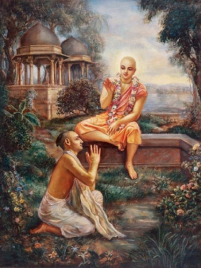Disciple Seminar to Standardize Training for New Devotees
By Madhava Smullen | May 01, 2011

A new seminar, educating prospective initiates on everything they need to know about being a disciple in ISKCON, is in the final stages of development and is expected to be available worldwide by next year. The program was created under the direction of the GBC Guru Services Committee, with the cooperation of the Mayapur Institute for Higher Education (MIHE) and the Vaishnava Training and Education Ministry (VTE).
The idea first arose in 2007, while the Guru Services Committee—including leaders such as Bhakti Chaitanya Swami, Prahladananda Swami, Ravindra Svarupa Dasa, Virabahu Dasa, and Anuttama Dasa—were developing a seminar to help equip Gurus with a better understanding of how to perform their service.
“It became clear that many of the things we would be discussing in the seminar for Gurus were important for new disciples to learn, too,” says Anuttama Dasa. “So we decided to develop a disciple’s seminar as well.”
The Guru Seminar, which included topics such as devotee care, spiritual health, and allegiance to Srila Prabhupada, was first offered in Ujjain, India, in 2008. In addition, it was presented to ISKCON’s Governing Body Commission (GBC) as a requirement for all future gurus—a recommendation which the GBC endorsed enthusiastically.
Following this success, the Guru Services Committee called a brainstorming session for four days in 2010 in Mayapur, India, bringing together gurus, managers, and teachers to discuss a potential similar Disciple’s Seminar.
“The team included Ravindra Svarupa, Prahladananda Swami, Mayapur Institute teacher Atul Krishna Dasa, former Vrindavana Gurukula principal Ananda Vrindavana Dasi, ISKCON Resolve Director Braja-Bihari Dasa, long-time educator Laxmimoni Dasi, scholar Madhavananda Dasa, and myself,” Anuttama says.
“Our aim was to assess what the needs were in our society for educating prospective disciples.”
From these initial talks, the team developed an outline. The Seminar, which is still under development, begins by giving deep understandings of parampara, the ancient Vaishnava line of gurus and disciples, as well as the position of Srila Prabhupada—now and into the future—as ISKCON’s Founder Acharya.
Next, the position of a guru within ISKCON is explained, as are the different types of gurus—Such as Diksha gurus (those who give formal initation), Siksha gurus (those who give instruction), and Vartma-Pradarshaka gurus (those who first show one the spiritual path).
The Seminar also covers how to select a guru; the importance of initiation vows and maintaining them; the importance of both personal service to the guru and service to the guru’s instructions; and how to offer proper respect and worship to the guru.
“It’s important to note here that we’re not just talking about the Diksha guru, but also Siksha gurus,” Anuttama explains. “In ISKCON, we’ve tended to put too much emphasis on Diksha gurus, without understanding the importance of Siksha gurus. So one of the things that the team developing the Seminar considered a priority was clarifying the historic significance of Siksha gurus.”
The Seminar also covers Guru-Puja and the importance of formal worship of our Founder Acharya Srila Prabhupada; how to offer proper respect to senior devotees and Vaishnavas in general; and how to balance obligations to ISKCON and to the greater society. Finally, it also includes advice on when one should reject a spiritual master.
A trial run of the Seminar was offered to a select group of around fifteen devotees during the Mayapur GBC meetings in February 2011, which included teachers, the Seminar’s original creators, and the target audience for the course: new, not-yet initiated devotees.
This “pilot” of the Seminar, which consists of twenty-four hours of instruction and is given over four days, was taught by Atul Krishna Dasa of the Mayapur Institute; Taraka Dasi, a teacher based in Australia; and Anuttama.
“The trial run was a chance for us to receive feedback, analyze how effective the content was and how well the attendees understood it, and see if there were certain things we needed to adjust,” Anuttama says. “Right now we’re re-editing it, with a view to teaching it again in Mumbai during the fall GBC meetings there.”
By early next year, the team is hoping to make the Seminar available worldwide, both in an online version that is still in development, and in a classroom version that can be taught by authorized VTE-trained teachers all over the world.
“The idea is that ISKCON temples or congregational groups could offer the Seminar twice a year as essential training for any of their members that are considering getting initiated now or sometime in the future,” Anuttama says. “Meanwhile, devotees who don’t live near a temple or congregational group could take it online.”
The Seminar is also expected to be translated into Hindi, Bengali, Russian, Portuguese, Spanish, and Chinese within the next year, with editions in other languages planned further down the line.
In addition, the Guru Services Committee will present the Seminar to the GBC for review next year, in the hope that it will be endorsed as a requirement for all future disciples in ISKCON, just as the Guru Seminar became a requirement for all gurus.
“When you think about it, we’re asking people—when they get initiated into Srila Prabhupada’s movement—to take some very serious vows,” Anuttama says.
“And as a community, I think there’s no doubt that we have to more systematically train people to be prepared for that commitment. The first of Srila
Prabhupada’s seven purposes in his mission statement for ISKCON is to ‘systematically propagate spiritual knowledge.’ I think part of that is becoming more systematic about teaching new members of ISKCON what it means to make lifelong commitments to their initiation vows.”















